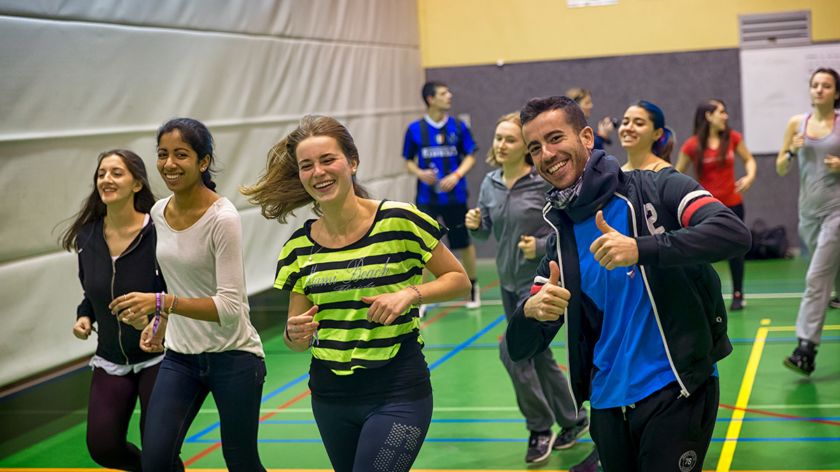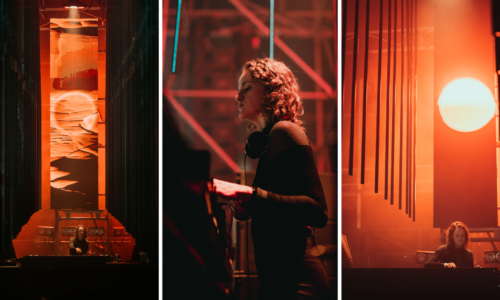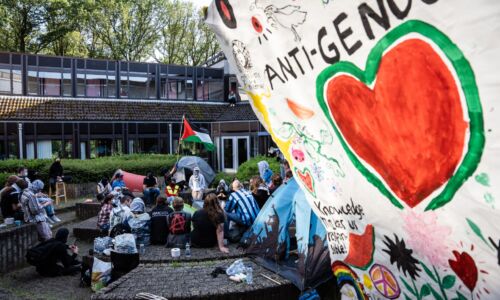‘We shouldn’t just focus on Germany’
-
 Orientation for international students. Photo: Dick van Aalst
Orientation for international students. Photo: Dick van Aalst
A lecture hall with students from Brabant, the Achterhoek, South Africa, Indonesia and Brazil: that’s the ideal at Radboud University. ‘International students should grow in diversity more than in numbers,’ says Laura Derkse, a member of the international Master’s recruitment team.
South Africa, Mexico, Brazil, Ireland, Bulgaria and Lithuania. Those are just some of the countries where Radboud University is currently trying to attract students to its Bachelor’s and Master’s programmes. The ultimate goal: to reach as diverse a student population as possible.
But how does the university decide where to recruit its students? ‘The university is trying to create as diverse a student body as possible,’ says Laura Derkse, a member of the international Master’s recruitment team. ‘For example, we don’t want ninety percent of our international students to come from Germany.’
Brazilian perspective
‘In addition, the pre-education trajectory – secondary school for our Bachelor’s programme and the Bachelor’s degree for our Master’s programme – in the countries we approach must offer adequate preparation for our programmes. Does it sufficiently prepare students to study here? That’s the most important criterion.’
But there are still many other countries to recruit students from?
‘That’s true, which is why we also look at some extra parameters. Are there enough students for us to go abroad? Is there an interest in coming to the Netherlands to study? There has always been a large attraction in Indonesia, but much less in Taiwan. We also check to see if students have the financial means to study here – not all students are eligible for a scholarship. And finally, the students have to add to our diversity.’
What does diversity mean for Radboud University?
‘In the new strategic plan, the Executive Board indicated that its goal isn’t to simply increase the number of international students. The international classroom is our priority. We want to achieve as good a geographical and cultural spread as possible. So we’re not just concentrating on Europe. The idea is that our students will get diverse perspectives on their programmes of study. A Chinese or Brazilian perspective on the programme can offer additional value. We are trying to create a mix of European, South American and Asian students.’
What countries are you focusing on with your recruitment efforts?
‘We’re currently investigating possibilities in Africa – a colleague of mine is now visiting South Africa. And we are also focusing on Mexico and Brazil, for example. In Europe we are looking at Ireland, Bulgaria, Lithuania, Spain and Italy and in Asia at Russia, China, India and South Korea. We’re also active in the Emirates.’
‘In all of these countries we visit schools and universities, give presentations and take part in fairs. In some countries we work with local representatives, often alumni. And we also advertise online and are very active on social media.’
Why does the university have local representatives in Indonesia and India and not in China, for example?
‘In Indonesia and India it’s important to work with an intermediary. We can’t always be present and it’s not sustainable to travel there twice a year. Our representative tells prospective students precisely what we want to tell them. In the United Kingdom students can find their own way to our admission office.’
Top five
Most of the international Master’s students at Radboud University are from Germany, followed by Greece, Spain, Italy and India. Germany also holds first place for Bachelor students, followed by Lithuania, Latvia, Romania and Bulgaria.
‘We also have a representative in China, but they work on a smaller scale. This is related to what the university is already doing in those countries and if there’s an interest in a collaboration agreement.’
Are potential students always approached in their own language?
‘Yes, as much as possible. Via the admission office we communicate in English, but at fairs we always have students or alumni who speak to prospective students in their own language.’
‘New international students are always phoned in their own language’
‘Once students have been admitted to Radboud University, they often have questions that they don’t dare ask a staff member. This is why we always have someone – often a student – phone them who speaks their own language. Evaluations show that the students appreciate this very much.’
Is student recruitment more successful in some countries more than in others?
‘It’s easier to reach students in Germany than students in South Korea. They often have more financial means and a better idea of what studying in Nijmegen involves. But we have to give students from as many countries as possible the chance to study with us or elsewhere in the Netherlands. That cultural awareness is important, especially in a world where globalization is important. We can’t just focus on Germany.’
Does the mix of international students differ for each programme?
‘A technical university attracts students from other countries than a broad university such as Radboud University does. Generally speaking, students from Brazil are more interested in social sciences and students from India more in computer science and artificial intelligence. Each country has an interest or focus. We take this into account in our communication.’



